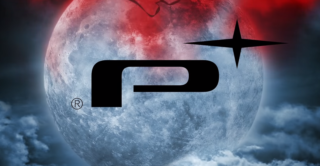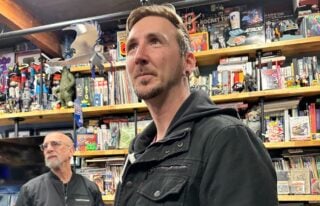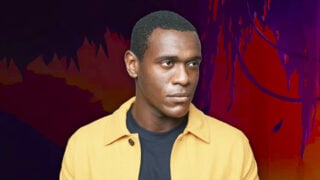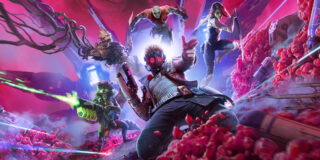PlatinumGames interview: ‘Only one project in my career went according to schedule’
Kamiya and Inaba discuss their retro revival Sol Cresta and the ongoing wait for Bayonetta 3

PlatinumGames boss Atsushi Inaba isn’t convinced the pandemic has delayed its projects. Not yet, at least.
Depending on which way you look at it, the Osaka, Japan-based studio has either been very productive – by December it would’ve released three games in two years – or is now entering its fourth year without a significant update on the highly-anticipated Bayonetta 3.
In our latest discussion with Inaba and Hideki Kamiya (studio creative director), the pair provided updates on both the elusive Nintendo exclusive and how it’s dealing with pandemic production.
“In my time in the games industry, there’s actually only been one title that went according to schedule,” Inaba said. “Pretty much every game is going to have issues come up at some point, so it’s hard to say specifically if it’s because of the pandemic or if it was something that would’ve happened naturally.

“With remote work there are of course some difficulties, but you can’t really attribute any particular loss to something right now. Maybe once we’re hopefully out of it, it will be easier to look back and see. We’re just handling things as they come right now.”
Devil May Cry creator Kamiya also discussed Sol Cresta, the first entry in a retro-themed initiative from the studio which it hopes will see it release a number of classic revivals under the ‘Neo Classic Arcade’ banner.
Inaba and Kamiya were talking to VGC’s Andy Robinson via video call.
Sol Cresta is your next big release. What was the appeal of working on a title like this right now?
Kamiya: Actually, it was about three years ago that I had the idea for Sol Cresta. I had a game design doc that I’ve been keeping warm and thinking of how to improve. I’ve always had love for 2D games since I was a kid, especially shooting games, so I was thinking about how I could incorporate that into a game that I could work on.
I had the concept of having three ships, where the abilities of each ship would kind of switch them around, and have them dock and split up. I had the idea of maybe coming up with a new world and a completely new IP, but then the idea of borrowing some of the ideas of this existing IP came up. So now we have the three ships concept, some new ideas for settings and worlds, while also respecting and keeping elements of those earlier games.
I hope it will please fans both of the shooting genre and those earlier games.
Three years in planning suggests that it wasn’t ever an April Fools joke as first thought?
Kamiya: It actually ended up being a case of fortuitous timing. We did have the idea and game design doc for Sol Cresta, and I’m on good terms with Mr. Hamada, the president of Hamster. I did a live stream with him for Arcade Archives, so we had a relationship we’d been building for some time. I showed Mr. Hamada the game design document and he was very pleased with it and trusted us with the handling of this IP, which of course is very important to Hamster.
We weren’t able to begin full work on the project immediately at that time, but we had a skeleton crew working little by little and when it came time to plan something for April Fools we decided to go ahead and make the trailer, but there was always real work going on under the surface.
Kamiya-san, this is clearly a passion project for you. Is it refreshing to be able to work on something a little more old-school, indie almost, considering the massive effort required to make modern games?
Kamiya: Going back to something like Viewtiful Joe where we had a small team, after that we gradually had these larger and larger teams. There are maybe some more dynamic things you can do with the larger teams, but then when you come back to a smaller project every person tends to get more involved and concentrated, so the individual members have more input.
Especially with a genre like shooting where you’re not really thinking about huge maps or cut-scenes, you have the ability to focus on that one important part of what you’re trying to do. That itself is liberating… it makes it a little easier.
“It may sound a little grimy, but with triple-A games to a certain extent you can fool people with pretty graphics, huge maps and a ton of levels… you have that ‘triple-A feel’ that you can almost trick people with.”
How did you feel personally about being able to go back and work on a smaller team? Was it a nice relief to be able to have a break from big budget titles, especially considering your experience with Scalebound?
Kamiya: Even though the scope and scale of the project is relatively smaller, it doesn’t necessarily mean you get to relax – especially with the shooting genre. With your average triple-A games you can use cut-scenes and graphics as sort of decorative parts you can use to boost the game, whereas shooting is a very simple idea, right? You shoot at enemies and that’s the pillar of the gameplay. You have to find the fun within that and making sure that this very simple idea is fun and is a challenge.
It may sound a little grimy, but with triple-A games to a certain extent you can fool people with pretty graphics, huge maps and a ton of levels… you have that ‘triple-A feel’ that you can almost trick people with. Not that anyone’s trying to trick people, but sometimes that’s something that can be done when you’re working on a larger, more expensive title.
But when you have a genre that’s as simple and straightforward as shooting, you don’t have any of those crutches to fall back on, so you really have to pull out the fun with your original idea and make sure that the thing that you want to do is actually something that people want to play. That’s one of the most enjoyable challenges of working on something like Sol Cresta.
How many other plans for secret retro revivals do you have lying around?
Kamiya: The thing about the Sol Cresta idea and sitting on that plan, it’s not necessarily that we’re looking to revive classic IPs. We have this Neo-Classic Arcade series that we’re looking to start as PlatinumGames and Sol Cresta just happens to be the first title in that series.

The idea behind it is not looking at a specific IP or game, but taking that feel of those older games of the 8-bit and 16-bit era and bring back the days where you really had to find the fun and didn’t have all the bells and whistles that we have these days. I want to take that core of gameplay from those earlier days and then add some new elements.
We have the technology now to improve on some of those ideas or maybe realise some pillars that weren’t possible back then, but you still have the gameplay and core mechanics. So you have the classic game and add ‘neo’ elements. We might look at side-scrolling shooting, beat-em-ups and other older genres and incorporate those new ideas.
So is it more of a case that if there happened to be a classic genre available for a Neo-Classic Arcade concept, then you might pursue it?
Kamiya: Yeah, it’s not that we want to avoid that, it’s just got to be what we want to do.
As a collector, what do you make of the recent explosion in retro game prices? It’s been alleged that market manipulation could be behind some recent million-dollar auctions.
Kamiya: As a collector myself, I understand the lure of wanting to have that game in the sealed package. People want the value of that package and not necessarily of the game itself. But as a fan, it’s a problem if somebody wants to play a game but they can’t get it because it’s being traded in these ridiculous marketplaces.
And the responsibility for keeping those games available belongs to the company that owns the IP. If people want to play a classic game and they can’t, because it’s not available on new platforms and can’t be found in its original form either, that’s like a threat… it’s holding game culture back. The people who own the rights to these games should be actively making moves to preserve game culture and making games available to everyone who wants to play them.
“If people want to play a classic game and they can’t, because it’s not available on new platforms and can’t be found in its original form either, that’s like a threat… it’s holding game culture back.”
Most studios have been understandably unproductive during the pandemic, but you will have released three titles in two years by December. Have you had any projects slip internally? Or have you really transitioned to remote working unharmed?
Inaba: We’re still feeling out the process. It’s only been a year and some change as far as a lot of this is concerned. As far as the Platinum stance to general development is concerned, the passion, interest and desire is still there and that’s allowed us to maintain some of the pace that we had pre-coronavirus.
There’s more difficulty not necessarily in maintaining the momentum we had before, but in forming new connections. For example, trying to start some kind of relationship with a company we haven’t worked with before or even in the case of new hires coming into the company, it’s not going to be as easy to have those interpersonal connections, since most of us are working from home.
So there is some difficulty, but it’s still hard to say for game dev in general where things are falling in regards to that, because it is an ongoing process and we’re still trying to work some things out.
Behind the scenes, have any of your game projects slipped in terms of scheduling?
Inaba: In my time in the games industry, there’s actually only been one title that went according to schedule. Pretty much every game is going to have issues come up at some point, so it’s hard to say specifically if it’s because of the pandemic or if it was something that would’ve happened naturally.
With remote work, there are of course some difficulties, but you can’t really attribute any particular loss to something right now. Maybe once we’re hopefully out of it, it will be easier to look back and see. We’re just handling things as they come right now.

This year marks the fifth anniversary of Star Fox Zero. This feels like one of the only big Wii U titles not yet ported to Switch. If Nintendo approved, is that something that would interest you?
Inaba: It’s unfortunate that people aren’t able to play older games because they’re locked out of the platform, so of course if possible we’d like to bring over any of those older titles to the newer platforms. It kind of depends on what’s in the realm of actual possibility, but yes, if the chance came up it’s definitely something we’d like to think about.
It seems like a new version could create a lot of opportunity in terms of reacting to fan feedback and possibly creating a new control scheme, for example. What are your thoughts regarding that?
Inaba: The important thing to remember there is that because it’s Nintendo’s IP, the ideas are coming from Miyamoto-san himself. We have to respect what Miyamoto-san wants to do. Of course, at that time there was a lot of discussion between Platinum and Nintendo, but if the opportunity came up to bring Star Fox Zero to the Switch again it would be more of a question of what he would like to do in that opportunity, and of course we would respect that again.
It must be difficult to give feedback to someone as prestigious as Mr. Miyamoto?
Inaba: Actually, Yusuke Hashimoto, who was working on Star Fox as director at the time but is no longer with the company, he was probably the one who had the most trouble taking the ideas to Mr. Miyamoto, Because aside from how he is personally, he is a giant in the industry and somebody who a lot of creators look up to. So, it takes a lot of courage or anyone to go to him with ideas or feedback.
“If the opportunity came up to bring Star Fox Zero to the Switch again it would be more of a question of what he would like to do in that opportunity, and of course we would respect that again.”
Kamiya-san, when we last spoke in January you said that because Project GG was being self-published, you could share details whenever you wanted without getting into trouble. So, what can you tell us exclusively about how it’s progressing?
Kamiya: I can tell you that development is proceeding apace! (laughs)
In January you said the project was in a prototyping phase. Have things started to ramp up on that yet?
Inaba: We are in prototyping and things are starting to get made. It is growing.
How have you balanced your role on Sol Cresta with Project GG?
Kamiya: In my position as chief game designer at the studio I’m pretty much looking at every project that we’re working on, giving advise and stepping in where needed. But the main focus right now is the direction on Project GG, which we just said is in prototype. For Sol Cresta I’m the creative director, so I’m overseeing the project with the main direction being handled by Takanori Sato.
Of course, because we’re nearing release, a little more attention is being paid there to taking care of it, but I’m still not fully on that one, because he is the director. So it’s more about overseeing the project that being a full director… I’m sort of in between.
And of course, because the world of Bayonetta is something that I created and am fostering, I’m taking a look at Bayonetta 3 and keeping my eye on it. But I’m kind of busy with other projects as well.
That’s a nice segue… When we spoke in January about whether you would provide an update on Bayonetta 3 this year, you said “it’s safe to expect that something will come out. There’s still a lot of the year left”. Well, there’s now 3 months left. Should fans still expect?
Kamiya: It was more of a not definitely ‘something will come out this year’, but if there is a year, then something should happen, right? If you remember last time, I said that even though everyone was asking about Bayonetta 3, maybe you should tell everyone to forget about it for a while. I kind of need to keep to that stance for now because ultimately, it’s not our decision what to say and when to say it.
Inaba: There’s no need to worry. Don’t worry about it at this time. Everything’s OK.
It must be very hard for you to keep quiet? I imagine it’s as tough for you as it is for the fans?
Kamiya: As much as everyone is clamouring to see it, we are really, really waiting to release it too. Everyone who is working on the project is of course very proud of what we’re doing and wants everyone to see what we’re doing. As much as fans are waiting for it, we are waiting for the day when we can show it. We want everyone to cheer us on as we run to the final stretch. We want to show it too!
Inaba-san, in our last chat you called Astral Chain’s Takahisa Taura your best director and suggested that he could pick and choose his next project. Has he started working on anything yet?
Inaba: We’ve got to keep the superstar busy! (laughs) He’s working on something, but we can’t say what it is.
Might we see it announced soon?
Inaba: It would be nice if that happened! (laughs)









